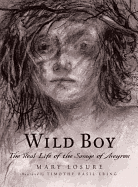
Gripping, haunting, and fascinating, Wild Boy carries the same emotional impact as its subject--a feral child discovered when he was about age 10 in Southern France in the late 1700s. The boy was taken to the mountainous village of Lacaune and instantly became a magnet for scientists, doctors, tourists, teachers and bullies.
Mary Losure (The Fairy Ring) lyrically and smoothly tells a story full of discovery and pain, as some "men of science" declared the boy an "imbecile," while others, particularly Jean-Marc-Gaspard Itard, sensed untapped potential in him. Losure does an especially fine job of exploring the gray area between science and humanity as Dr. Itard struggles to be a teacher, psychiatrist and, at times, father, to the boy he dubbed "Victor." Quotations from Itard's journals tell of his conflicting feelings. Though Losure researched her subject exhaustively and includes extensive back matter that makes this exemplary nonfiction, she never bogs down the story with too many facts or jargon. Her writing emphasizes story over science--a choice that honors Victor himself.
Timothy Basil Ering's smudged charcoal illustrations highlight Victor's facial expressions, which range from tormented to angry to joyful to wondering. Though Victor could never speak beyond simple vocabulary, those who knew Victor were always impressed by the starkness of his emotions, a quality Ering captures beautifully. Working together, Losure and Ering never leave readers in doubt as to Victor's humanity. Readers will be struck by the differences between themselves and Victor, but also haunted by the similarities. --Allie Jane Bruce, children's librarian, Bank Street College of Education

